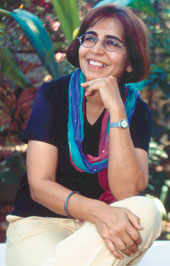 |
Every commuter in Mumbai will understand the dilemma faced by the characters in Anju Makhija?s play, The Last Train. It?s a political satire played out in a suburban Mumbai train that?s halted for unknown reasons on Vashi Bridge. ?Travelling in local trains here is an everyday affair, where one sees a lot of bizarre incidents. The idea of this play originated while I was travelling in a Panvel train,? says Makhija.
The play, which opened at Mumbai?s National Gallery of Modern Art recently, has attracted attention even internationally. It was once shortlisted for the BBC World Playwriting Award in 1999. The current show is being organised and supported by the British Council.
Produced by Dreamworks Production and directed by NSD graduate Ashok Banthia, The Last Train features stage actors like Kanika Dang and Rajkumar Kanojia as well as Banthia himself. ?It is entirely Indian in situation and circumstances which is why it evokes immediate identification. The dilemmas that the characters face are familiar and a part of our lives. Going by the response, we have plans to take it to the Mumbai suburbs and then to other cities of India,? says Makhija.
The play itself opens in a Mumbai local train that has halted on Vashi bridge late at night. Three friends are stranded in a compartment with a very attractive woman. While each one is anxious to get home, a roller-coaster ride full of surprises awaits them. A VIP, who happens to be a politician, is involved in a car accident near the railway crossing and his head is severed from his body. A political plot is suspected and a reward is offered for the missing head. As the tension builds, the reward goes up to five lakhs for the missing head. ?In little over an hour, the play provides an insight into the topsy-turvy Mumbai life, one that every Mumbaikar can relate to,? says Makhija.
Makhija says she gets her inspiration from day-to-day happenings around her. ?The play?s plot is derived from the fact that ordinary situations are often blown out of proportion and at times, political drama is created out of it,? she says.
She?s also enthusiastic about the current production. ?Although I have scripted the play, the entire credit goes to the director who has extracted the best from the actors.? In terms of set decoration, Banthia even built a train compartment and resorted to a soundtrack to lend a sense of travelling by train.
Besides the play, Makhija has also scripted a bilingual play titled If Wishes were Horses, directed by Anahita Uberoi and starring Kitu Gidwani and Joy Sengupta. The plot revolves around a rich lady who gives her posh Cuffe Parade apartment in South Mumbai to a phulwali (flower-seller). In Now She Says She?s God, a light-hearted romantic comedy jointly scripted by Makhija and Anurag Kashyap, the story, set in a bar, is about an encounter with God. Directed by Cyrus Dastur, the cast includes Tom Alter and Rouble Nagi, and is a colourful extravaganza, complete with live music.
Besides writing plays in India, Makhija has also assisted in scriptwriting for a European-Indian multimedia theatre project. Titled Total Slammer Masala, the project, being directed by Belgian director Michael Laub, combines tragedy and triviality, fiction and realism, dance and play as well as elements of music and art. ?The play was staged at the Berlin Theatre Festival in 2003 and was an instant hit. The text of the performance was based on the theme of unrequited love and had ornate sets with Kathakali and ballet dancers flown in from South India and New York,? says Makhija.
But Makhija does more than just write plays. She prefers to be introduced first as a poet and then as a scriptwriter. She?s written a book of poems called View from the Web, which won her the All India Poetry Prize from the British Council in 1995. ?After theatre, poetry is very close to my heart. Though it, I can express my thoughts and emotions. I have completed writing a book of poems called First Nakedness which explores my relationship with my daughter,? she explains.
Anju?s desire to write started early. But her initial choice of career was an entirely different one. She studied mass communications from Concordia University in Montreal before a short stint as a copywriter at Greenhouse Communications in Canada. She returned to India and worked for Doordarshan and the Children?s Film Society till she gave it all up to pursue her passion for theatre. She is currently editing a series of Indian plays along with director Alok Bhalla for the Sahitya Academy.
As a writer, however, Makhija feels that a lot is happening in terms of meaningful plays. But she rues the lack of good production houses coming forward to support such plays. ?No matter how good a play is, it has to run commercially. But it is heartening to note that a lot of young people are trying out newer themes. I too want to explore different genres as I believe that repetition signals death,? she explains.
So what?s next for Makhija? ?I?ve almost finished a translation of a 16th century Sufi poet, Shah Abdul Latif, Seeking the Beloved. And I then plan to translate this book of poems into a play,? she says. And since she derives her inspiration from life in the crowded and action-packed cities around her, she should be busy for a long time to come.
Photograph by Gajanan Dudhalkar










